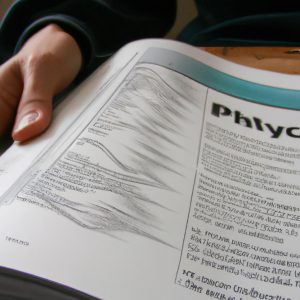Funding Opportunities for Physics Research

The pursuit of scientific knowledge is often hindered by the lack of financial resources required for research. This article aims to explore various funding opportunities available to physicists, encompassing government grants, scholarships and fellowships, corporate sponsorship, non-profit funding, international sources, and crowdfunding platforms.
By providing an overview of these avenues, this article seeks to equip physics researchers with the necessary information to secure financial support for their studies. As the adage goes, ‘Money makes the world go round,’ and understanding these funding options can greatly enhance one’s scientific pursuits.
While this article explores the world of physics and scientific discovery, financial resources remain crucial for powering innovation and research in the field. For an in-depth look at the funding opportunities available to physics students and researchers, check out this comprehensive guide on “Funding Opportunities for Physics Research”. Covering everything from government grants to corporate sponsorships and crowdfunding campaigns, this is an invaluable resource for any physicist looking to finance their next breakthrough project. Now back to our discussion on the fascinating world of physics research and the discoveries pushing the boundaries of human knowledge.
Government Grants for Physics Research
This discussion examines the available grant options, eligibility and requirements, as well as the application and evaluation process for government grants supporting physics research.
The analysis covers various funding opportunities that researchers can access to finance their projects in the field of physics. It also investigates the specific criteria that applicants need to meet in order to be eligible for these grants, along with the necessary documentation and qualifications required.
Additionally, this study explores the application procedures involved in submitting a proposal for physics research funding and delves into the evaluation process used by granting agencies to assess applications and award funds.
Available Grant Options
One notable aspect of available grant options for physics research is the diversity and range of funding sources that researchers can access.
Research funding in the field of physics can come from various avenues, including private donors, university grants, research foundations, and crowdfunding campaigns.
Private donors play a significant role in supporting physics research by providing financial resources to individual researchers or research institutions.
University grants offer opportunities for physicists to secure funds for their projects through internal grant programs specifically designed to support academic research.
Research foundations also contribute to funding opportunities by offering grants that are dedicated to advancing scientific knowledge in the field of physics.
Additionally, crowdfunding campaigns have emerged as an alternative method for researchers to raise funds directly from the public who share an interest in advancing physics research.
Eligibility and Requirements
Eligibility and requirements for grants in the field of physics are determined by various factors, such as the applicant’s academic qualifications, research proposal, and alignment with the funding organization’s objectives.
Funding criteria play a crucial role in determining whether an applicant qualifies for financial support. These criteria may include specific academic achievements, such as a minimum GPA or publication record, as well as the track record of the proposed research project.
The research proposal itself is another important component considered during grant evaluation. It should clearly outline the aims, methodology, and expected outcomes of the project.
Additionally, funding duration refers to the length of time for which financial support will be provided to successful applicants. This varies depending on the funding organization and can range from short-term to long-term support.
It is also important to note that there may be certain limitations on funding, such as restrictions on expenditure or geographical location. Researchers should carefully review these limitations before applying for grants in order to ensure their eligibility and suitability for financial assistance in their pursuit of physics research endeavors.
Application and Evaluation Process
The application and evaluation process for grants in the field of physics involves a thorough assessment of the applicant’s qualifications, research proposal, and alignment with the objectives of the funding organization.
The application process typically requires applicants to submit a detailed research proposal outlining their project’s scientific significance, methodology, and expected outcomes. Additionally, applicants are required to provide information about their educational background, relevant experience, and any publications or presentations related to their research area.
Once applications are received, they undergo a rigorous selection process which often includes peer review. In this stage, experts in the field evaluate the proposals based on predetermined selection criteria such as scientific merit, feasibility of the project timeline, potential impact on the field of physics, and alignment with the goals of the funding organization.
Scholarships and Fellowships for Physics Students
Scholarships and fellowships available to physics students provide financial support for their academic pursuits and facilitate their involvement in cutting-edge research projects. These funding opportunities not only alleviate the financial burden but also offer several additional benefits to students.
- Research opportunities: Scholarships and fellowships often come with research requirements or provide access to exclusive research programs, allowing students to gain hands-on experience in their field of interest.
- Financial aid: These grants can cover tuition fees, living expenses, and research-related costs, ensuring that students can focus on their studies without worrying about financial constraints.
- Academic support: Recipients of scholarships and fellowships are often provided with mentorship from experienced faculty members or access to academic resources, enabling them to excel academically.
Moreover, these funding programs offer avenues for career advancement by connecting students with industry professionals and potential employers through networking events and conferences.
Overall, scholarships and fellowships play a crucial role in nurturing future physicists by providing them with the necessary resources for success in academia and beyond.
Corporate Sponsorship for Physics Projects
Corporate sponsorship plays a vital role in supporting and advancing physics projects. It provides financial resources and fosters collaboration between academia and industry. Industry partnerships and research collaborations enable scientists to access private funding, crucial for conducting high-quality research with significant scientific advancement potential.
These partnerships facilitate the exchange of knowledge, expertise, and resources between academia and industry, leading to innovation support. The involvement of corporations in physics projects brings diverse perspectives, technological expertise, and practical applications to the table.
Non-profit Funding for Physics Research
Non-profit organizations provide crucial financial support and resources for advancing scientific investigations in the field of physics. These organizations play a vital role in funding opportunities for physics research, enabling scientists to pursue their studies and make significant contributions to the field.
Here are three key ways non-profit organizations contribute to physics research:
- Philanthropic donations for physics research: Generous individuals and philanthropic foundations donate funds specifically designated for supporting scientific research in physics. These donations can be used to finance equipment, laboratory facilities, and even scholarships for aspiring physicists.
- Foundation grants for physics projects: Non-profit foundations offer grant programs that fund specific research projects in physics. Researchers can apply for these grants to obtain financial support necessary for conducting experiments, data analysis, or publishing results.
- Academic institution support for physics studies: Many non-profit educational institutions have dedicated departments or centers that focus on supporting physics studies. They provide funding opportunities such as scholarships, fellowships, and research assistant positions to encourage students and faculty members to engage in innovative research.
These funding mechanisms not only promote individual scientific advancements but also foster collaborative efforts among physicists by providing resources and platforms that facilitate cooperation across institutions.
Keywords: philanthropic donations for physics research, foundation grants for physics projects, academic institution support for physics studies
International Funding Opportunities for Physics Studies
International collaborations in the field of physics have opened up avenues for global exchange and cross-cultural learning, enhancing the overall quality and diversity of scientific investigations. Collaborative research initiatives serve as a platform for researchers from different regions to work together, sharing their expertise and resources.
Research exchange programs further facilitate knowledge transfer by allowing scientists to spend time at international institutions, fostering new perspectives and approaches. International conference funding enables researchers to present their findings on a global scale, encouraging discussions and collaborations across borders.
Postdoctoral research grants provide opportunities for early career physicists to gain valuable experience in international research environments. Additionally, efforts are being made to ensure that research funding is accessible to underrepresented regions, promoting equity and inclusivity in the field of physics.
These international funding opportunities contribute significantly towards advancing scientific knowledge and fostering a sense of belonging among physicists worldwide.
Crowdfunding Platforms for Physics Innovation
Crowdfunding platforms have emerged as alternative avenues for financial support in the advancement of innovative projects and initiatives in the field of physics. These online campaigns allow researchers and scientists to showcase their ideas and gather community support through donor contributions. The use of crowdfunding for scientific breakthroughs in physics has gained popularity due to its ability to connect researchers with a global audience willing to contribute financially.
Benefits of using crowdfunding platforms for physics innovation include:
- Community Support: Crowdfunding allows researchers to build a community around their project, fostering collaboration and engagement.
- Online Campaigns: Online platforms provide a convenient and accessible way for physicists to present their work, reaching potential donors worldwide.
- Donor Contributions: Through crowdfunding, individuals can contribute financially towards cutting-edge research, enabling scientific progress.
Overall, crowdfunding provides an avenue for physicists to showcase their innovations while fostering a sense of belonging within a supportive community invested in advancing scientific knowledge.
Conclusion
In conclusion, the world of physics research offers a plethora of funding opportunities that can propel scientific discovery and innovation forward.
From government grants to scholarships and fellowships, corporate sponsorships to non-profit funding, and even international collaborations, there are many avenues for physicists to explore.
Additionally, the rise of crowdfunding platforms has opened up new possibilities for individuals to contribute directly to physics projects.
So, while obtaining funding may seem like a daunting task, the irony lies in the fact that there are countless ways for physicists to secure financial support and continue pushing the boundaries of knowledge.







